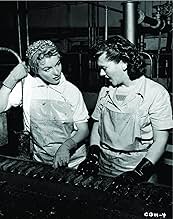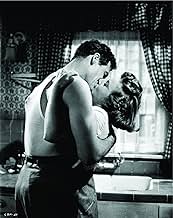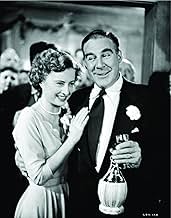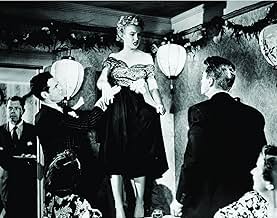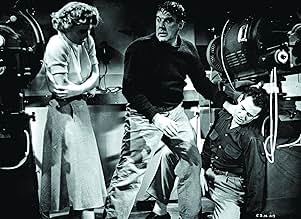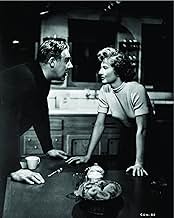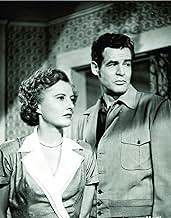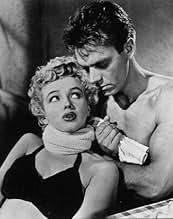VALUTAZIONE IMDb
7,0/10
7888
LA TUA VALUTAZIONE
Mae Doyle torna nella sua città natale diventata una cinica. Suo fratello Joe teme che la sua amante Peggy finirà come lei. Mae sposa Jerry e ha un bambino: è felice ma nervosa, attratta da ... Leggi tuttoMae Doyle torna nella sua città natale diventata una cinica. Suo fratello Joe teme che la sua amante Peggy finirà come lei. Mae sposa Jerry e ha un bambino: è felice ma nervosa, attratta da Earl, l'amico di Jerry.Mae Doyle torna nella sua città natale diventata una cinica. Suo fratello Joe teme che la sua amante Peggy finirà come lei. Mae sposa Jerry e ha un bambino: è felice ma nervosa, attratta da Earl, l'amico di Jerry.
- Premi
- 3 vittorie totali
William Bailey
- Waiter
- (non citato nei titoli originali)
Harry Baum
- Restaurant Patron
- (non citato nei titoli originali)
Dan Bernaducci
- Guest
- (non citato nei titoli originali)
Albert Cavens
- Restaurant Patron
- (non citato nei titoli originali)
Dick Cherney
- Fisherman
- (non citato nei titoli originali)
Charles Cirillo
- Restaurant Patron
- (non citato nei titoli originali)
Irene Crosby
- Guest
- (non citato nei titoli originali)
Russell Custer
- Fisherman
- (non citato nei titoli originali)
Tony Dante
- Fisherman
- (non citato nei titoli originali)
Roy Darmour
- Man
- (non citato nei titoli originali)
Recensioni in evidenza
This Fritz Lang film has been largely ignored though in it's way it is as psychologically astute as many of his better known works such as "Scarlett Street". In transposing a Clifford Odets play from New York to a Californian fishing community some of the more florid dialogue seems unnaturally heightened but the performances of the three principals (Barbara Stanwyck, Robert Ryan and particularly Paul Douglas) are stunning and the emotional core of the film is so strong that an audience can feel bruised by what's on screen. The blue collar milieu is perfectly evoked, the black-and-white cinematography by Nicholas Musuraca is first-rate and even the score seems understated, adding to, rather than detracting from the dramatic effect. Essential viewing.
The bitter and cynical Mae Doyle (Barbara Stanwyck) returns to the fishing village where she was raised after deceptive loves and life in New York. She meets her brother, the fisherman Joe Doyle (Keith Andes), and he lodges her in his home. Mae is courted by Jerry D'Amato (Paul Douglas), a good and naive man that owns the boat where Joe works, and he introduces his brutal friend Earl Pfeiffer (Robert Ryan), who works as theater's projectionist and is cheated by his wife. She does not like Earl and his jokes, but Jerry considers him his friend and they frequently see each other. Mae decides to accept the proposal of Jerry and they get married and one year later they have a baby girl. When the wife of Earl leaves him, he becomes depressed and Mae, who is bored with her loveless marriage, has an affair with him.
"Clash by Night" is an unpleasant drama with a bitter story and a moralist conclusion, actually a minor film of Master Fritz Lang in his career in Hollywood. Barbara Stanwyck has another magnificent performance in the role of a woman hardened by her bad sentimental and life experiences in the big city that returns home due to the lack of option. There is one quote ("When you run out of places, home is all you have left") that defines her mood. Paul Douglas plays a good honest man that nurses his old father, helps his crook alcoholic uncle and accepts the past of Mae Doyle, giving her a second chance. Robert Ryan plays a despicable rude man and disloyal friend. The affair between Mae and Earl has no chemistry and is only sexual desire. Last but not the least, it is delightful to see Marilyn Monroe playing a silly character. My vote is seven.
Title (Brazil: "Só a Mulher Peca" ("Only the Woman Sins")
"Clash by Night" is an unpleasant drama with a bitter story and a moralist conclusion, actually a minor film of Master Fritz Lang in his career in Hollywood. Barbara Stanwyck has another magnificent performance in the role of a woman hardened by her bad sentimental and life experiences in the big city that returns home due to the lack of option. There is one quote ("When you run out of places, home is all you have left") that defines her mood. Paul Douglas plays a good honest man that nurses his old father, helps his crook alcoholic uncle and accepts the past of Mae Doyle, giving her a second chance. Robert Ryan plays a despicable rude man and disloyal friend. The affair between Mae and Earl has no chemistry and is only sexual desire. Last but not the least, it is delightful to see Marilyn Monroe playing a silly character. My vote is seven.
Title (Brazil: "Só a Mulher Peca" ("Only the Woman Sins")
Barbara Stanwyck, Paul Douglas, Robert Ryan, Marilyn Monroe, and Keith Andes star in "Clash by Night," based on the play by Clifford Odets that flopped on Broadway. It gets the full-blown treatment on the screen, with Fritz Lang directing and a strong group of actors.
Stanwyck is a world-weary woman who comes back to her roots because "home is where you go when you run out of places," and immediately attracts male attention from both Ryan and Paul Douglas. She's instantly attracted to Ryan, and each recognizes in the other an edginess and need for excitement.
To fight these urges, which haven't brought her any joy in the past, she marries Douglas, a simple fisherman who is deeply in love with her. It's not long before she gets antsy.
The acting is terrific, but the emotions are very big - possibly too big for the screen and more suited to the stage. Though everyone is excellent, Douglas has the sympathetic role and breaks your heart as the cuckolded husband.
Ryan is great as a volcano waiting to erupt, and Stanwyck's portrayal is ferociously honest and layered. She was 45 at the time of thee filming and obviously playing someone a good 10 years younger, but it still works.
Marilyn Monroe has a supporting role playing the girlfriend of handsome Keith Andes. He mainly shows off his physique, though he was actually a good actor who had success in TV and was also a powerful singer, playing opposite Lucille Ball on Broadway in "Wildcat."
Monroe, mostly in jeans and with a swimsuit scene, is beautiful and her acting is very natural. Later on in her career, she overpronounced her words, which worked well in comedy but less so in drama.
This is a very good movie with vigorous direction by Lang. There's just not much about it that's subtle.
Stanwyck is a world-weary woman who comes back to her roots because "home is where you go when you run out of places," and immediately attracts male attention from both Ryan and Paul Douglas. She's instantly attracted to Ryan, and each recognizes in the other an edginess and need for excitement.
To fight these urges, which haven't brought her any joy in the past, she marries Douglas, a simple fisherman who is deeply in love with her. It's not long before she gets antsy.
The acting is terrific, but the emotions are very big - possibly too big for the screen and more suited to the stage. Though everyone is excellent, Douglas has the sympathetic role and breaks your heart as the cuckolded husband.
Ryan is great as a volcano waiting to erupt, and Stanwyck's portrayal is ferociously honest and layered. She was 45 at the time of thee filming and obviously playing someone a good 10 years younger, but it still works.
Marilyn Monroe has a supporting role playing the girlfriend of handsome Keith Andes. He mainly shows off his physique, though he was actually a good actor who had success in TV and was also a powerful singer, playing opposite Lucille Ball on Broadway in "Wildcat."
Monroe, mostly in jeans and with a swimsuit scene, is beautiful and her acting is very natural. Later on in her career, she overpronounced her words, which worked well in comedy but less so in drama.
This is a very good movie with vigorous direction by Lang. There's just not much about it that's subtle.
The subheading in the IMDb page for "Clash by Night" calls this film noir. Many fans of the genre may be disappointed. It does have one of the great film noir directors in Fritz Lang and stars two of the genres foremost performers in Barbara Stanwyck(DOUBLE INDEMNITY) and Robert Ryan(The Set Up). However, the style is more romantic drama than film noir. It reminds me of the filmed plays by Elia Kazan like "A Streetcar Named Desire". It even has a character screaming a name out the window. I guess the crime element is missing here but I guess infidelity would fit. The dialogue is up to the standard you'd expect a luminary like Clifford Odets to create. I was unsure if I would agree with the way the film ended but the characterization and plot were so well done, I knew that the ending would not disappoint. I was right.
A hardened woman returns home to a fishing village only to be caught between two men.
At least the movie has Andes and Monroe whose characters come across as refreshingly natural, along with revealing stock footage of the fishing industry. However, the rest of the film is pitched about ten decibels over the top, with all the subtlety of a hammer blow. Douglas's Jerry is not just a nice guy, he's a rub-your-nose-in-it Nice Guy. Similarly for Ryan's cynical Earl and Stanwyck's hard case Mae. Not even such first-rate performers as these can overcome the relentlessly overblown dialog or stagy sets. Nor does it appear the three were allowed to shade their performances beyond one-dimensional caricature. At the same time, the symbolism of roiling seas and surging tide is about as necessary as gravy on soup. In short, the movie amounts to a textbook exercise of heavy-handed histrionics and too much talk, Fritz Lang or no Fritz Lang.
I expect other reviewers are right about the material being shaped for 1950's audiences. In those days, one way of getting people away from TV was to promise them titillation since there was none on TV. But then producers faced the problem of Production Code limits on what could be shown or said on screen, especially in the way of sex. Thus, the emphasis in the film is on the atmospherics of desire instead of anything more literal. This results in a movie that, unfortunately, drowns in an overlay of heavy breathing, standard innuendo, and redundant symbolism. Such may have titillated audiences then; now there's just a dreary sameness in the repetition. At the same time, that turnaround ending shouldn't be overlooked. Unhappily, it's of the same Code-compromised sort that damaged more 50's movies than just this one.
I guess my biggest regret is how the movie takes three of Hollywood's most capable actors and reduces them to near-caricature of their usual screen persona, Douglas and Ryan, especially. Here's hoping they were at least well paid.
At least the movie has Andes and Monroe whose characters come across as refreshingly natural, along with revealing stock footage of the fishing industry. However, the rest of the film is pitched about ten decibels over the top, with all the subtlety of a hammer blow. Douglas's Jerry is not just a nice guy, he's a rub-your-nose-in-it Nice Guy. Similarly for Ryan's cynical Earl and Stanwyck's hard case Mae. Not even such first-rate performers as these can overcome the relentlessly overblown dialog or stagy sets. Nor does it appear the three were allowed to shade their performances beyond one-dimensional caricature. At the same time, the symbolism of roiling seas and surging tide is about as necessary as gravy on soup. In short, the movie amounts to a textbook exercise of heavy-handed histrionics and too much talk, Fritz Lang or no Fritz Lang.
I expect other reviewers are right about the material being shaped for 1950's audiences. In those days, one way of getting people away from TV was to promise them titillation since there was none on TV. But then producers faced the problem of Production Code limits on what could be shown or said on screen, especially in the way of sex. Thus, the emphasis in the film is on the atmospherics of desire instead of anything more literal. This results in a movie that, unfortunately, drowns in an overlay of heavy breathing, standard innuendo, and redundant symbolism. Such may have titillated audiences then; now there's just a dreary sameness in the repetition. At the same time, that turnaround ending shouldn't be overlooked. Unhappily, it's of the same Code-compromised sort that damaged more 50's movies than just this one.
I guess my biggest regret is how the movie takes three of Hollywood's most capable actors and reduces them to near-caricature of their usual screen persona, Douglas and Ryan, especially. Here's hoping they were at least well paid.
Lo sapevi?
- QuizThis movie was shot while Barbara Stanwyck was in the process of divorcing Robert Taylor. The movie also features the rising young star Marilyn Monroe. Barbara gives a good performance in one of her most memorable films. Despite her emotional devastation due to the divorce, the crew noted Stanwyck's lack of a diva tantrum. Fritz Lang later said, "She's fantastic, unbelievable, and I liked her tremendously. When Marilyn missed her lines - which she did constantly - Barbara never said a word."
- BlooperWhile at the tavern, Mae and Jerry watch the moon rise over the ocean. The film takes place in Monterey, California, which is on the West coast, where the moon rises over the hills and sets on the ocean.
- Curiosità sui creditiand introducing Keith Andes
- ConnessioniEdited into Les Amoureux du cinéma (1987)
- Colonne sonoreI Hear a Rhapsody
Written by George Fragos (uncredited), Jack Baker (uncredited) and Dick Gasparre (uncredited)
Sung by Tony Martin
I più visti
Accedi per valutare e creare un elenco di titoli salvati per ottenere consigli personalizzati
- How long is Clash by Night?Powered by Alexa
Dettagli
Botteghino
- Lordo in tutto il mondo
- 62 USD
- Tempo di esecuzione1 ora 45 minuti
- Colore
- Proporzioni
- 1.37 : 1
Contribuisci a questa pagina
Suggerisci una modifica o aggiungi i contenuti mancanti

Divario superiore
What is the Japanese language plot outline for La confessione della signora Doyle (1952)?
Rispondi

